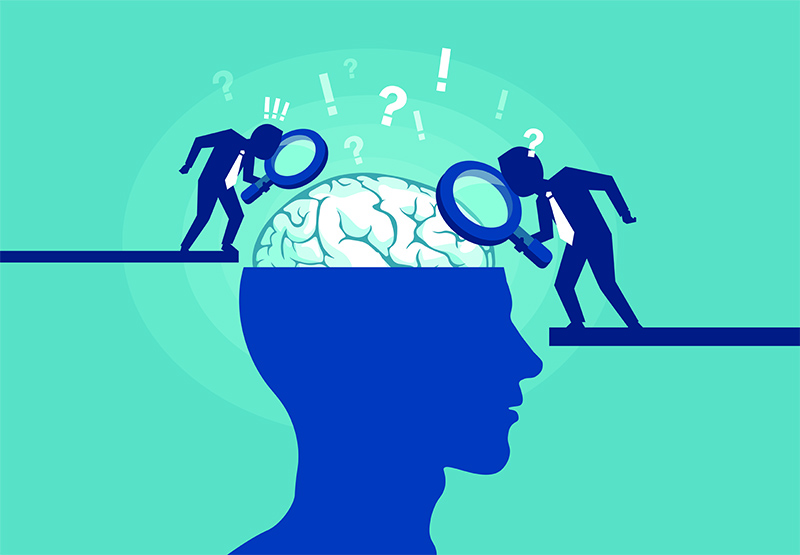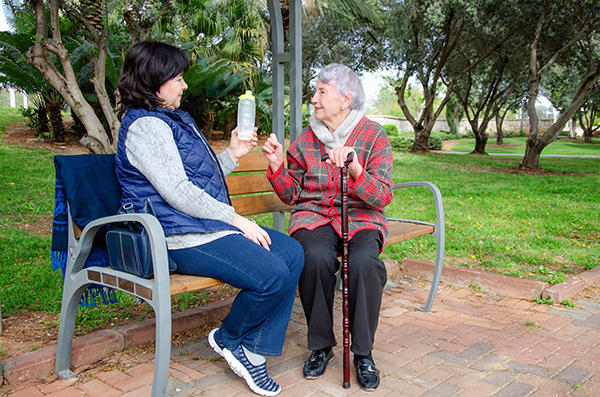
Is It Dementia or Just Senior Forgetfulness? You altogether forgot about the doctor’s appointment scheduled for last Tuesday, misplaced your reading glasses for the umpteenth time, and cannot remember the name of your new neighbor for the life of you. Is all of this simply a typical part of aging, or could it be the start of Alzheimer’s disease or another form of dementia? The worry about developing dementia is not unusual, and it’s increasing, as Alzheimer's has garnered more awareness with more than half a million Canadians living with dementia today. The prevalence of the disease contributes to anxieties about our own possible decrease in independence and functionality, as well as memory difficulties. In addition, it brings up questions regarding future care and living arrangements, if the time should come that help is needed to stay safe and to take care of everyday needs. However, it’s important to know there are multiple causes of senior forgetfulness, which are completely unconnected to dementia, and some amount…

Provide the Best Dementia Care by Creating a Calming Environment Agitation is amongst the more challenging effects of dementia, and can be extremely hard for family members to handle. The key is in taking steps to deal with agitation before it is felt and conveyed by the senior, which involves keeping track of what has initiated these feelings in the past, and establishing a home environment where those triggers are eliminated or reduced. These guidelines from our Windsor-Essex dementia care team can help: Designate a place of retreat. When life begins to get stressful, having a specially created spot for the senior to go to de-stress can work wonders in restoring calm. This might be a specific room, or perhaps a comfy corner with several soothing activities readily available, quiet music, a soothing scent to enjoy like lavender or vanilla – whatever offers peace and relaxation for the older adult. Assess the house for distressing objects. Focus on exactly what your senior loved one is sensitive to, such as specific decorations, mirrors (which…

The Unique Vision Problems with Dementia and How to Help The intricate steps required to enable us to see are mind-boggling. In the blink of an eye, our brains are able to take transmitted information about the world all around us, translate that information based on input from other senses, memories, and thoughts, and then shape a perception of the information for making us aware of what we’re seeing. It is not a surprise that there are unique vision problems with dementia, particularly in the aspects of: Depth and/or color perception Contrast Motion detection Peripheral vision Furthermore, those diagnosed with dementia can frequently experience a distorted sense of reality in the form of illusions. As an example, someone with dementia might see a shadow on the ground, and mistake it for something innocent, such as the family pet, or a threat, such as an intruder – which can present quite a challenge for family caregivers. Other types of vision problems with dementia can consist of: Misinterpreting reflections in glass or mirrors for…

The Promising Alzheimer’s Treatment Causing Researchers to Take a Second Look After 16 very long years without any truly viable treatment options for Alzheimer’s, there is some hope on the horizon, in a stunning reversal from the previously-rejected antibody therapy, aducanumab. The most recent research reveals that high doses of the medication do, in fact, lessen cognitive decline in the early stages of Alzheimer’s. As stated by Rebecca Edelmayer, director of scientific engagement at the Alzheimer’s Association, “It could be a game-changer for the field. It could be one of the first disease-modifying therapies approved for Alzheimer’s disease.” Biogen, the maker of aducanumab, estimates substantial benefits for dementia patients in a variety of aspects: activities of daily living, memory, language, and orientation. Biogen stated its plans to pursue regulatory approval within the United States, with a longer-term goal of launching the medication as an Alzheimer’s treatment option internationally. With a forecasted request for approval from the…

When Living with Dementia, Use These Simple Methods for Effective Communication Connecting with a senior loved one trying to cope with all the struggles of Alzheimer’s or dementia, particularly in the middle and later stages, may be frustrating – both for you and for your loved one. Brain changes affect the ability to hear, process, and respond effectively to conversations, and it’s up to us to employ new ways of communicating in order to connect with an individual more successfully. However, doing so is much easier than it may seem. We already communicate nonverbally in a variety of ways, such as: Physical contact Posture and motion Eye contact Facial expressions Gestures Personal space Consider these methods to incorporate more nonverbal communication in your interactions with a senior loved one: Offer assurance through a caring touch. If a senior loved one is comfortable with touch, hold and pat the senior’s hand, rub his/her back, put an arm around your loved one’s shoulders, and provide affectionate hugs. Look the senior in the eye. Eye contact conveys…

5 Things That Can Worsen Alzheimer’s Symptoms While there are particular commonalities, Alzheimer’s disease affects every person uniquely. Our highly trained dementia caregivers know, for instance, that even though one person may find pleasure in being outdoors, another could possibly be overwhelmed by so much sensory input and prefer a quieter indoor environment. One may prefer a morning bath routine, while a dose of resourcefulness is important to help another maintain good hygiene. We also understand that there are particular triggers that could often worsen Alzheimer’s symptoms. Family care providers should always be especially careful in order to avoid the following: Dehydration. Those with dementia may not be in a position to identify when they are thirsty, or may reject offered fluids. It’s crucial to ensure proper hydration to prevent added confusion and weakness. Plain water is best, but if refused, try flavored waters, as well as various kinds of cups or bottles. Isolation. Individuals diagnosed with dementia suffer…



















